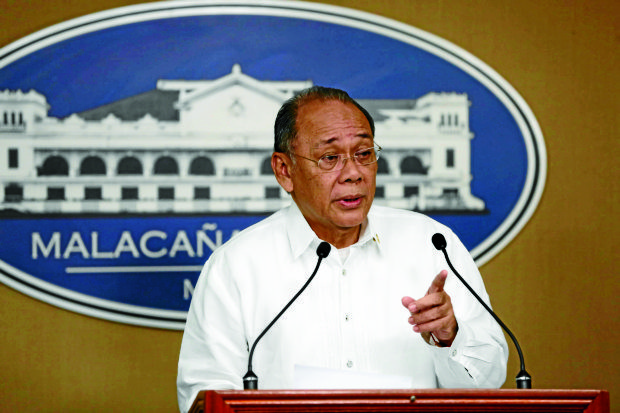Palace tells EU: Don’t link trade to abuses
Malacañang told the European Union (EU) on Sunday not to link trade to allegations of human rights violations by the government, a day after the EU envoy to Manila said Philippine trade with Europe may be affected by President Duterte’s brutal war on drugs.
More than 8,000 drug suspects have been killed since Mr. Duterte launched the crackdown after taking office in June last year.
But presidential spokesperson Ernesto Abella reminded the European Union that the Commission on Human Rights had said its initial findings showed extrajudicial killings in the campaign against drugs were not sanctioned by the government.
Premature conclusion
Abella was referring to remarks by CHR Commissioner Gwen Pimentel-Gana on Monday, which the CHR took back on Tuesday as “premature.”
The CHR said an investigation of extrajudicial killings was still going on, and called for an end to speculations whether all or some of the killings were state-sponsored until every case was resolved.
Article continues after this advertisement“Nontrade accusations, especially if baseless and undeserved, should therefore not be linked with trade programs,” Abella said in a statement.
Article continues after this advertisementAbella was reacting to EU Ambassador to Manila Franz Jessen’s statement on Saturday that trade with Europe would be affected if the government continued to ignore warnings on human rights violations, including its bloody war on drugs.
Jessen said the European Union was expecting the Philippines to abide by the United Nations conventions it had signed related to respect for human rights and good government.
“We are monitoring the respect of these UN conventions by the Philippines and we will carefully consider what implications the findings might have for our trade engagement with the Philippines,” Jessen said.
President Duterte has been slamming the European Union and its lawmakers for criticizing his war on drugs.
‘Legitimate police operations’
In his statement on Sunday, Abella gave assurance that the Philippine National Police was conducting “legitimate police operations that require observance of operational protocols” and those “who breach procedures are answerable to the law.”
“We assure our friends and allies that the Philippines will respect its international commitments,” he said.
Abella made it clear the campaign against drugs being waged by the government “intends to protect the innocent, [whom] illegal drugs would destroy.”
“The Philippines is also now ready for economic takeoff, as evidenced by the record high foreign direct investments at $7.9 billion in 2016 or 44 percent higher than the previous year, more so as we institute discipline and restore peace and order,” he said.
“We would rather that the European Parliament engage us as partners in nation-building, as the visionary EU business community seems to intend themselves,” he added.
On a radio program on Sunday, Senate Majority Leader Vicente Sotto III defended the war on drugs anew, blaming its bad image on Mr. Duterte’s critics, who he said were bloating figures to show the killings of drug suspects were sanctioned by the government.
Sotto said the illegal drug trade had victimized a lot of Filipinos who had ended up dead, but he said the EU appeared to be focused on just the picture of a woman grieving over the body of her slain husband, an alleged drug pusher.
“How about the families of drug victims who are also crying?” Sotto said.
He said Mr. Duterte was on the right track because the President’s campaign was focused on street drug pushers, the “backbone of the illegal drug trade” in the country.
